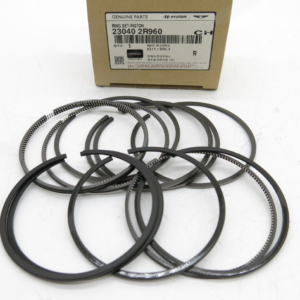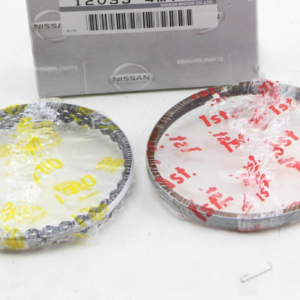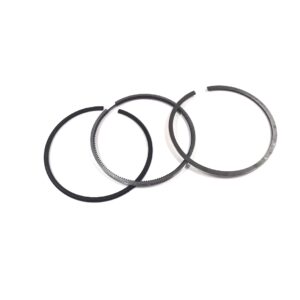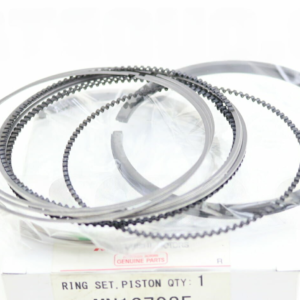Title: Sealing Success: The Essential Role of Piston Rings in Car Engines
Introduction:
In the heart of every car engine lies a vital component that plays a crucial role in ensuring smooth operation and optimal performance: the piston ring. Despite its small size, the piston ring is a critical part of the engine assembly, contributing to efficient combustion, minimizing friction, and maintaining compression. In this blog, we’ll delve into the world of piston rings, exploring their function, importance, and the key role they play in the operation of car engines.
What are Piston Rings?
Piston rings are circular bands typically made of high-strength steel or cast iron that are fitted around the circumference of the piston. They form a seal between the piston and the cylinder wall, preventing combustion gases from escaping into the crankcase while also sealing in the lubricating oil.
Functionality:
But how do piston rings work their magic? As the piston moves up and down within the cylinder, the piston rings create a seal against the cylinder wall, forming a barrier that prevents the escape of combustion gases from the combustion chamber into the crankcase. Additionally, the piston rings help regulate the distribution of oil on the cylinder wall, ensuring proper lubrication of the piston assembly and minimizing friction.
Importance:
The importance of piston rings in car engines cannot be overstated. These small but critical components are essential for maintaining compression, optimizing combustion efficiency, and reducing friction within the engine. A properly functioning set of piston rings ensures smooth engine operation, optimal power output, and extended engine life.
Types of Piston Rings:
There are several types of piston rings used in car engines, each serving a specific purpose:
1. Compression Rings: These are the topmost rings and are responsible for sealing the combustion chamber and maintaining compression.
2. Oil Control Rings: Located below the compression rings, oil control rings regulate the distribution of oil along the cylinder wall and prevent excessive oil consumption.
3. Scraper Rings: Also known as wiper rings, scraper rings help remove excess oil from the cylinder wall during the downward stroke of the piston, preventing oil from entering the combustion chamber.
Maintenance and Replacement:
Proper maintenance of piston rings is essential to ensure optimal engine performance and longevity. Over time, piston rings may wear out due to normal engine operation, leading to decreased compression, increased oil consumption, and loss of power. Regular oil changes, using high-quality lubricants, and following the manufacturer’s recommended maintenance schedule can help prolong the life of piston rings. If issues arise, such as excessive oil consumption or loss of compression, professional inspection and replacement of piston rings may be necessary to restore proper engine function.
Conclusion:
In conclusion, piston rings may be small components, but their impact on the performance and longevity of car engines is significant. By forming a tight seal between the piston and cylinder wall, piston rings ensure efficient combustion, minimize friction, and maintain compression, resulting in smooth engine operation and optimal performance. So, the next time you turn the key and feel the engine roar to life, take a moment to appreciate the unsung heroes working behind the scenes—the piston rings.
In stock (can be backordered)
$18,926.31
Title: Sealing Success: The Essential Role of Piston Rings in Car Engines
Introduction:
In the heart of every car engine lies a vital component that plays a crucial role in ensuring smooth operation and optimal performance: the piston ring. Despite its small size, the piston ring is a critical part of the engine assembly, contributing to efficient combustion, minimizing friction, and maintaining compression. In this blog, we’ll delve into the world of piston rings, exploring their function, importance, and the key role they play in the operation of car engines.
What are Piston Rings?
Piston rings are circular bands typically made of high-strength steel or cast iron that are fitted around the circumference of the piston. They form a seal between the piston and the cylinder wall, preventing combustion gases from escaping into the crankcase while also sealing in the lubricating oil.
Functionality:
But how do piston rings work their magic? As the piston moves up and down within the cylinder, the piston rings create a seal against the cylinder wall, forming a barrier that prevents the escape of combustion gases from the combustion chamber into the crankcase. Additionally, the piston rings help regulate the distribution of oil on the cylinder wall, ensuring proper lubrication of the piston assembly and minimizing friction.
Importance:
The importance of piston rings in car engines cannot be overstated. These small but critical components are essential for maintaining compression, optimizing combustion efficiency, and reducing friction within the engine. A properly functioning set of piston rings ensures smooth engine operation, optimal power output, and extended engine life.
Types of Piston Rings:
There are several types of piston rings used in car engines, each serving a specific purpose:
1. Compression Rings: These are the topmost rings and are responsible for sealing the combustion chamber and maintaining compression.
2. Oil Control Rings: Located below the compression rings, oil control rings regulate the distribution of oil along the cylinder wall and prevent excessive oil consumption.
3. Scraper Rings: Also known as wiper rings, scraper rings help remove excess oil from the cylinder wall during the downward stroke of the piston, preventing oil from entering the combustion chamber.
Maintenance and Replacement:
Proper maintenance of piston rings is essential to ensure optimal engine performance and longevity. Over time, piston rings may wear out due to normal engine operation, leading to decreased compression, increased oil consumption, and loss of power. Regular oil changes, using high-quality lubricants, and following the manufacturer’s recommended maintenance schedule can help prolong the life of piston rings. If issues arise, such as excessive oil consumption or loss of compression, professional inspection and replacement of piston rings may be necessary to restore proper engine function.
Conclusion:
In conclusion, piston rings may be small components, but their impact on the performance and longevity of car engines is significant. By forming a tight seal between the piston and cylinder wall, piston rings ensure efficient combustion, minimize friction, and maintain compression, resulting in smooth engine operation and optimal performance. So, the next time you turn the key and feel the engine roar to life, take a moment to appreciate the unsung heroes working behind the scenes—the piston rings.




Get E-mail updates about our latest products and special offers.
Sensors and More is Jamaica’s ultimate online auto parts store. Established in 2020, we specialize in genuine electrical parts for Japanese, Read more…
Reviews
There are no reviews yet.